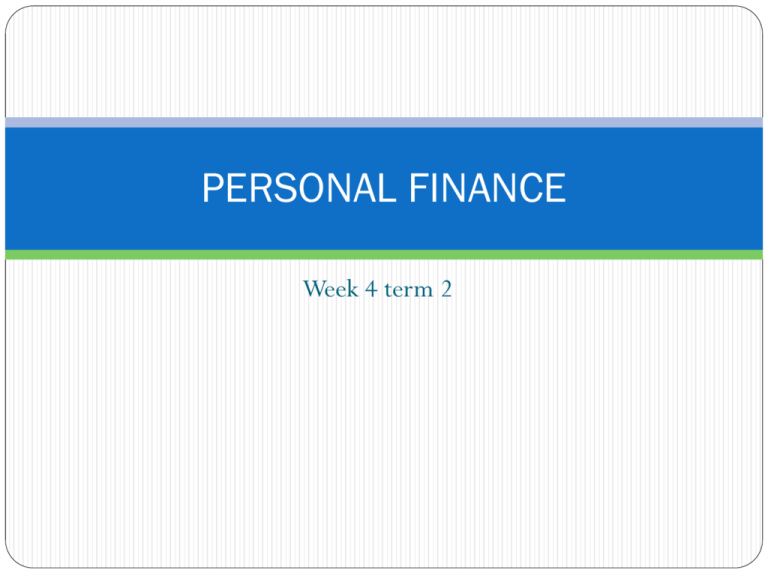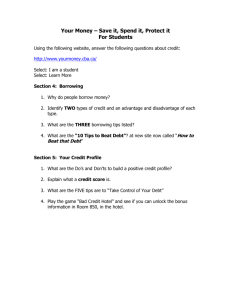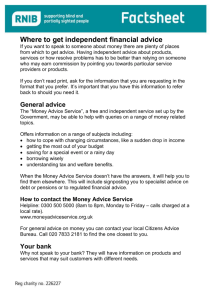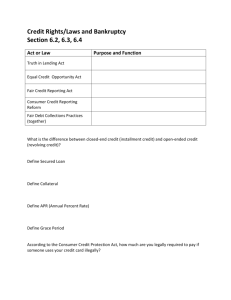PERSONAL FINANCE topic 320.6.11
advertisement

PERSONAL FINANCE Week 4 term 2 Earning an income Different types of income What is income? income Money earned from working and the returns on investments. However, there are many different ways to earn an income. In a commercial economy, most people make a living by working for an employer In Australia, nearly 86% of people are classified as employees Source of income Type of income Working for an employer Wage, salary, fee, comission Working for yourself: running your own business P Payments from the government S Investing savings and retirement money I Renting out property R Creating something new, such as writing a book or composing music R Playing professional sports or being a professional gambler P S D M What is a...? Wage Salary Fee Commission Profit Social security Interest and dividends Rent Royalties Prize money WAGE A wage is the money paid by an employer to an employee for a period of work. What type of people are paid a wage? The period is usually a week and the hours worked by the employee in the given period will determine the amount of wages the employee receives E.g. A person working 40 hours in a week at $8 an hour will be paid $320 (40x$8) TASK: find out what is the minimum wage in Australia? Why do we need a minimum wage? Are there any ‘western’ countries in the world that don’t have a minimum wage? How many hours a day is a worker required to work generally? Do most countries work the same hours every week? Overtime: each hour worked over 8 is considered overtime and must be paid at a higher hourly rate to compensate for the longer hours. So, if a person works for 10 hours, then eight will be paid at the normal wage rate and two will be paid at the overtime rate. Usually time an a half. Sundays? Politics? Travel for work? Penalty rate: rate is applied based on when a person works rather than how many hours are worked. E.g. A person who works Monday to Friday may be asked to work a public holiday..employee might get double time for working outside normal working hours SALARY A salary is paid to people who are employed on a yearly basis. This means their rate of pay is based on an amount per year rather than an amount per hour or week Salary –earners are employed on this basis because their job usually requires flexible working hours rather than a normal nine-to-five arrangement Generally, people who receive a salary are employed in skilled jobs e.g.? White collar workers SOME salaried jobs offer workers flexitime where workers are allowed to start or finish at times that suit them. E.g. A worker may prefer to start at 7.30 and finish at 3.30 or start at 9.30 and finish at 5.30 – same number of hours but at times that suit the employees Flexiday – workers are allowed to accumulate extra hours or work over a period of time and then apply for a day off (flexiday) Nine day fortnight and have a rostered day off RDO WAGE VS SALARY: QUESTIONS TO ANSWER Explain the difference between a wage and a salary What is overtime? Do you think sportspeople should earn such high incomes? Why? FEES Set charge by a professional for the completion of a job or task. Professionals such as accountants, doctors, dentists and solicitors receive fees. Often follow a schedule of fees, which may be set by a professional association e.g. The AMA Most doctors charge about the same for a simple consultation and most accountants charge the same fee for filing a tax return Fees are also paid to people in the performance and creative arts professional, such as musicians, artists and actors Guest speakers All these people will usually sign a contract or agreement which states what activities they must perform in order to earn their fees COMISSION A commission is usually paid to those who act as an agent, or go-between, between buyers and sellers. When a product is sold, the agent will be paid a commission which is usually a percentage of the selling price. E.g. ? Why might this not suit people? How can this be resolved? HOMEWORK Please find attached slides from today’s lesson. Those of you away make sure you read up to salary! Questions due for class on Thursday are as follows!; 1.find out what is the minimum wage in Australia? (ensure you find out what it is for 14 y/old 16 y/old and adult! 2.Why do we need a minimum wage? 3.Explain the difference between a wage and a salary 4.Do you think sportspeople should earn such high incomes? Why? See you all Thursday. Profits Self-employed – those who own their own business and receive their income by making PROFIT Business owners usually employ other people to help them make a profit. What is profit? The amount of income that is left over after all the business’s expenses are paid for What are a businesses expenses? Social Security The federal government provides are range of SOCIAL SECURITY payments that ensure all Australians have enough money to pay for the basic necessities of life E.g.? Unemployment benefits – job search allowance The ages pension The invalid pension Are these payments considered a source of income? Interest and dividends What are interest and dividends? INTEREST The return on invested money is regarded as income! Common way to save money is with a bank. Most people in Australia have bank accounts. When a person saves money in a bank account, the bank pays INTEREST to the account holder in return for the use of the money in the account. How do banks use holders’ invested savings? DIVIDENDS Another way to invest money is by purchasing shares on the Australian share market or stock exchange. What is this? Stock exchange and dividends continued.. When a public company makes a profit the SHAREHOLDERS in the company normally receive a percentage of the profit based on the number of shares they own. This payment is called a DIVIDEND http://www.asx.com.au/ Rent Is the money paid for the use of someone else’s property - usually a house, townhouse, flat or apartment. There are many different types of property that can be rented e.g.? Royalties Type of income paid to a person who Produces a piece of work such as? A song, a book...an invention...and a Copyright or patent is granted to protect the creator’s intellectual property Harry Potter – royalty payments from publisher of book also film CREATIVE COMMONS: http://creativecommons.org.au/about Prize money Small % of people earn their income from prize money Can you guess who? The money is ONLY considered to be income if the person receiving the prize money is a PROFESSIONAL gambler or game show contestant and earns this type of money regularly. EXCURSION MONDAY 30th May at 8.45am we depart so be at the bus! What is good about shopping centres like Westfield? Do you like or dislike shopping centres like Westfield? What is the alternative? Westfield and its founder? HOMEWORK: Find out how many Westfields there are and what countries they are in. http://www.youtube.com/watch?v=nOLv5oRNVZ0 http://www.abc.net.au/tv/familyconfidential/#/the-lowys-episode Spending and saving income What do you spend and what do you save? What we spend on our income can also be classified into fixed and variable expenditure: FIXED: recurring expenses such as...? VARIABLE: expenses that occur irregularly...? GENERALLY... The higher the income the more money we have for variable expenditure.. E.g. People shopping at Westfield Bondi Junction Is this always the case? Spending and saving income The older we get the more responsibilities we have and greater financial commitments e.g.? http://www.theaustralian.com.au/news/nation/richest-schoolsadd-higher-fees-to-funding-pool/story-e6frg6nf-1225973586825 Saving money To save means to put some money aside and spend it later rather than spend it now Piggybank VS Bank? Why do people save? Why do people save? Most common reason is that people can’t afford to purchase a good or service now because they don’t have enough money. The relationship between spending and saving is not only determined by how much a good cost to buy. A number of other factors contribute to our decision to sped or save, including: Our age Our disposable income (how much income after tax) How much wealth we have already accumulated Whether we are an impulse buyer or a ‘scrooge’ How risk averse we are (how willing we are to take a chance tha we may lose the money) Hypothetical person Possible spending pattern (fixed vs variable) Possible saving and investing pattern A 14/15 year old school girl who Variable: we pay for nothing! lives at home We don’t invest! An 18 year old student who lives at home and owns a car Fixed:fuel each week $40 Variable: car repairs books Investing in her education! An 18 year old person who lives away from home and goes to uni full time and has a part time job Fixed: rent, bills, telephone Variable: movies, drinks, dates, music concerts, holidays, uni books Share portfolio investments in resource companies Woodside, Rio Tinto A 30 year old person who has two school age children and has a mortgage A 70 year old female retiree who is a)Independently wealthy b) Receives the aged pension a) fixed: phone, internet b) Variable: clothing, holidays, fine dining, lots of clothes for grandchildren and particularly the granddaughters Borrowing money Why do people want to borrow money? WESTFIELD BOOKLETS CONVENIENT! Borrowing money People borrow money because they wish to spend more money than they have at the moment. They don’t want to put off their spending until the future when prices may have risen, instead they want to purchase their nee dor want NOW. Most Australians have to borrow money to purchase major items such as a house, a car or an overseas holiday Some people borrow money to invest in the share market or property market Businesses also borrow money to help finance their operations and expansion plans What is the best reason to borrow money? Borrowing money..what it all means When you borrow you are in DEBT Is this a problem? You must be able to control and make the repayments Debt causes difficulties if it starts to control you: when may this happen? Borrowing money Debt may start to control you when you have trouble making repayments or you borrow more to cover your existing debt What is the PRICE attached to borrowing? Loan principal= the money that is borrowed Repayment= loan principal + INTEREST When individuals or businesses borrow money, the main cost they need to pay is the interest charged by the lending institution. The interest charged on the loan principal will depend on the interest rate per annum, the duration or the loan, and the amount of the loan repaid each month! Different loans have different interest rates. Interest rates can be either fixed or variable. A fixed IR (interest rate) means the rate does not change for the duration of the loan. A variable rate, on the other hand, means that the lender can change the interest rate at any other time during the loan... Where can people go to borrow money? Where to borrow money? Insurance companies Banks Merchant banks Finance companies Credit unions Building societies What is the best known lender of money in Australia? Find definitions of each of the following terms: Insurance companies Banks Merchant banks Finance companies Credit unions Building societies How do financial institutions make their money? To ensure financial institutions are profitable, the interest people receive from saving is less than the interest they pay when they borrow This is why borrowing is costly Before you decide to borrow there are a number of issues to consider... What factors will affect your ability to get a loan? What factors will affect your ability to get a loan? All financial institutions will ensure that you can satisfy a number or requirements before they will grant you a loan. This is known as a CREDIT CHECK and takes into account the following factors and whether or not you can meet them: A stable job An employment history An address history Previous credit history A listing of your assets A listing of your liabilities Who would you loan to...? A) B) C) D) Sandy Soldi currently has two credit contracts. He has always paid his instalments on time. Sandy has recently lost his job and wants to borrow money to help him through this difficult time. Daria Denuto has been working for 12 years since leaving school. She has never had a loan as she had always paid for everything with cash. Daria wants to borrow money for a new car. Jose Johanessen was declared bankrupt three years ago after getting into debt to the value of $380 000. He has been working full time for the time for the last two years and wants to borrow money to go on an overseas holiday Eduardo Echaverria defaulted on two loans 10 years ago. He has just finished paying off another loan. He is working two casual jobs. Danny wants to borrow money to pay for a part-time course. Managing finances Sources of financial advice? Sources of financial advice The financial services industry: the range of organisations and the services offered The responsibilities of lenders and financial advisers and their legal obligations Sources of financial advice Money sections in newspapers Investment books and magazines Seminars, including those run by the Australian Stock exchange Financial planner or adviser To find out whether a financial adviser is accredited with the Financial Planning Association visit its website www.fpa.asn.au Laws that monitor the regulate the financial services industry The consumer credit code: www.creditcode.gov.au Legislation enforceable in certain situations where credit is offered. The code was developed as a national incentive to standardise credit practices in Australia. It applies in each Australian state and territory through that particular state’s or territory’s own acts or legislation. IN NSW it applies under the Consumer Credit (NSW) Act 1995: Managing finances Features of responsible financial management: Budgeting Saving Monitoring and record-keeping Avoiding over commitments Consequences of poor financial management Financial Legal social Laws that monitor the regulate the financial services industry The consumer credit code Investing money Reasons for investing Major purchase, extra income, retirement Overview of investment options - shares, property, superannuation, managed funds What are the consequences of poor financial management? What happens if you are unable to pay for all your expenses of have borrowed money, then you are in debt. Debt is not a problem..unless? You start having trouble making repayments.. What are the different scenarios that could occur?... POOR FINANCIAL MANAGMENT Consequence 1: Debt Consolidation Consolidate all debts into one debt such as your mortgage. This reduces interest costs when the interest rate of the single loan is lower than those of the individual credit cards and personal loans. The secret to making this work is to maintain your repayments and stop yourself from borrowing further. There may also be fees involved with debt consolidation. DEBT COLLECTORS What is a debt collector? DEBT COLLECTORS May start pursuing you for the lenders’ money There are legal limits on what debt collectors are allowed to do: If they visit you at home they should have already contacted you by mail or telephone Home visits cannot be used as a means of intimidation or harassment The Australian Competition and Consumer Commission (ACCC) guidelines for debt collection specify that a debt collector should only visit your home between 7.30am and 9pm They are not allowed to contact you on a Sunday or on public holidays. A debt collector should also leave your home immediately upon being asked Debt collectors should only contact you at work as a last resort or if you have expressly asked them to contact you at work. WHY? BANKRUPTCY You may file for bankruptcy... Why would you do this? If you are on a low income, declaring yourself bankrupt ay seem an easy way to clear all your debts By filing for bankruptcy through the courts, you no longer have an obligation to repay your debts...see article.. However, once you have been declared bankrupt, it remains on record with the Credit Reference Association for the next seven years What will this mean?? Can you bounce back from bankruptcy? DEBT COLLECTORS ACTIVITY Go to the ACCC website and search for information on debt collectors. Write a report that describes what debt collectors do and the rights of consumers http://www.accc.gov.au/content/index.phtml/itemId/142 TOMORROW!!! Want to get rich? Invest like a girl AND INVESTING BOOKLET! PLUS: TRAVEL OR ANOTHER OPTION?!?! What companies would you invest in? YOUR TASK: Try and come up with 5 companies you think would be good to invest in and answer the following questions on the companies: 1. What is the company and its core business 2. How many employees does the company have 3. How long has it been running 4. What is the company work: market capitalisation 5. Why do you believe this company is a good investment?






